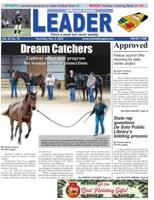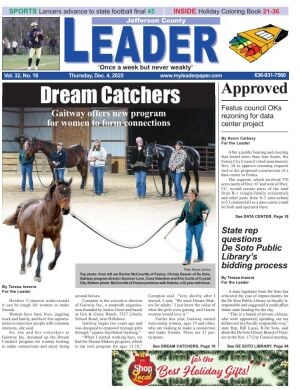The Missouri Supreme Court recently upheld a Jefferson County Circuit Court judge’s ruling that a Hindu religious group must comply with a House Springs neighborhood association’s rules and pay a portion of legal fees incurred during a 17-year land dispute.
In an 18-page decision, the Supreme Court on Dec. 10 upheld Jefferson County Div. 5 Circuit Judge Victor J. Melenbrink’s ruling that Nithyananda Dhyanapeetam of St. Louis must comply with the Millstone Property Owners Association’s restrictions that include paying yearly assessments and following lot maintenance rules for the subdivision, which includes 138.25 acres of land along Byrnesville Road, directly across from the Northwest Jefferson County Sports Complex.
The Supreme Court also agreed that the religious group must pay the association $50,000 in legal fees stemming from the court fight.
In addition, the Supreme Court upheld the lower court’s decision that a lake on the property is considered common ground, and the owners of Fogarty Farms, which formed the neighborhood association, may not eliminate it.
A plat for the property to be used as a residential subdivision was created in 2004.
Legal wranglings over how the land could be developed began in 2007 when a company named Ananda purchased the property from a company named Essex with the intent to build a Hindu worship center. The center was to include 107 residential units, two dorms, a temple, a continuing education center, a restaurant/souvenir shop, a dining hall, a meeting center and 512 parking spaces, according to Jefferson County Planning and Zoning Department records.
The county rejected plans for the worship center development after a citizens group came forward to oppose it, and after that, in 2008, Ananda sold three lots to Dhyanapeetam.
A year before selling the lots to Dhyanapeetam, Ananda built a warehouse for religious statues called deities.
The warehouse was considered a temple and was used by people who arranged for a religious leader called Swamiji “to come to the Temple and perform prana pratishtha,” described as a rare and sacred event that energized the deities, according to court filings.
According to the brief, the religious leader’s actual name is Supreme Pontiff of Hinduism Jagatguru Mahasanndhanam His Divine Holiness Bhagavan Nithyananda Paramashivam.
The brief also said that after the deities were energized by Swamiji, they had to be “appropriately cared for” through daily religious ritual.
Supreme Court Judge Robin Ransom wrote for the court that “Nithyananda members visited the carved stone deities daily until sometime in 2016 and used the lake lot, which was adjacent to Nithyananda’s lots, for spiritual purposes.”
In October 2015, Ananda transferred the remaining 21 subdivision lots to Fogarty Farms LLC by general warranty deed. Bill and Lauren Fogarty are associated with Fogarty Farms, and Bill Fogarty helped organize the citizens group that opposed the Hindu worship center, according to the brief.
After purchasing the 21 lots, Fogarty Farms created the Millstone Property Owners Association, and in June 2016, Fogarty Farms adopted “First Amendment to Millstone Subdivision Restrictions.”
The amendment purportedly sought to remove the lake lot as common ground and make it available for use as a saleable lot. The amendment also changed restrictions applicable to lots, according to court records.
In June 2017, the association sued Nithyananda, alleging breach of the restrictions for failure to pay assessments and failure to maintain the three lots and for not using the lots for residential use. The association sought foreclosure of the related liens, court documents said.
Nithyananda filed a counterclaim for declaratory relief, claiming Fogarty Farms had no valid assignment of developer rights from Essex and, consequently, had no authority to establish a board of directors capable of levying an assessment. Nithyananda also argued the Circuit Court should set aside the transfer of the lake lot to Fogarty Farms, according to court records.
Nithyananda Dhyanapeetam argued in court filings that the group owned the property first and that Fogarty Farms was “well aware of the intended purpose and use of the property” as a temple complex when it purchased the land.
Nithyananda Dhyanapeetam also said Fogarty Farms was not using the lots for their platted purposes and instead held “corporate events” on the land, “including stages, fireworks, bands, monster trucks and drones.”
The group also said in the filing that Fogarty never intended to develop the land for single-family dwellings.
Ransom wrote in her decision that the original property restrictions were created “expressly to preserve the right to require compliance in the future.”
The religious group’s lots were subject to the restrictions “even when certain provisions may not have been strictly enforced in the past,” Ransom wrote.
She also wrote in her decision that the lake would remain common ground because when lot owners were “sold on the promise” of certain common ground based on a subdivision plat, it is contrary to public policy to permit a developer to unilaterally alter the character of that common ground, even if the developer retains such authority through covenants.
It was foreseeable Ananda would expect Nithyananda to have access to the lake lot given the parties’ intentions to turn the subdivision into a temple complex, the decision said.




